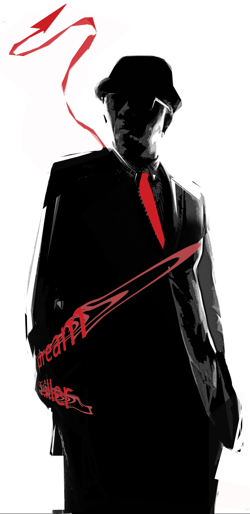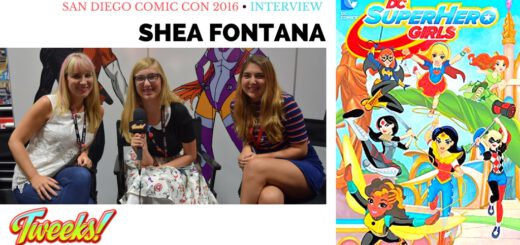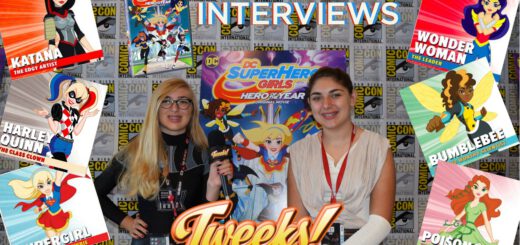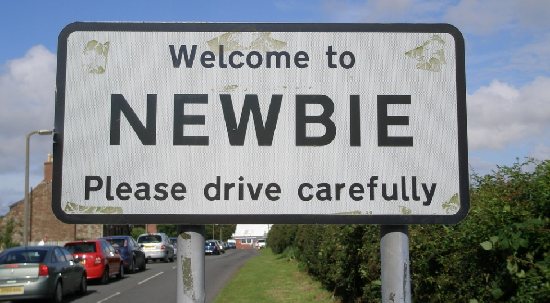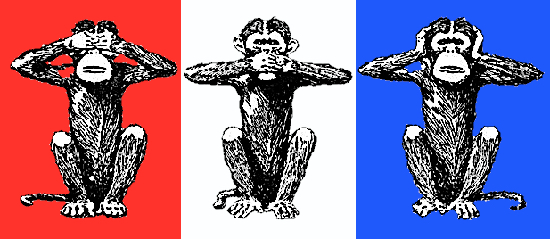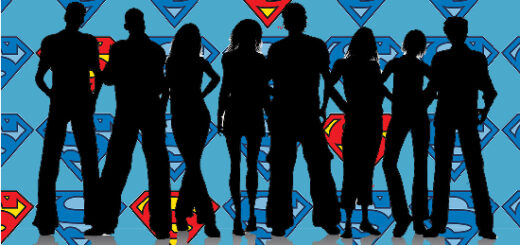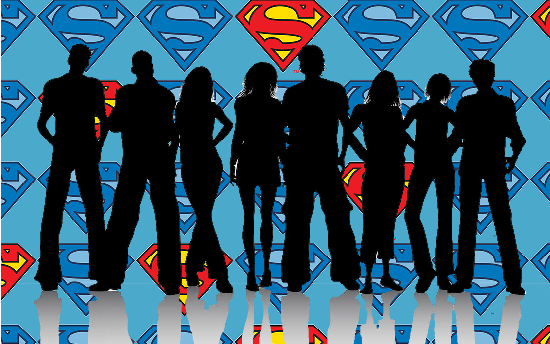Michael Davis: Dream Killer 4 – Publish or Perish
That, boys and girl, is called knowing the game. Those who don’t shouldn’t play. So despite being blackballed by one of the big two how was I able to thrive?
Alternative means of finding distribution, budget and happiness.
The vast majority of top tier creators in the industry use one option.
There are numerous more, and I’ll touch on those next time.
As well I will break down what option was preferred and why for the project I’m using for this series. I’ve been in the game for a long time. What I use as examples are not intended as a ‘how to’ to get into the comics biz. If so the series would be named ‘how to ruin your career.’
The underlying point is to look at the big picture when entering this field. I believe with every fiber of my being one should always look to do the right thing. Comics are a very small industry and to have a real shot, it’s counterproductive working on how well you write or draw without working on your relationships skills.
Put another way, when people tell who they are and what they are about, trust but verify.
“The vast majority of top tier creators in the industry use one option.There are numerous more, and I’ll touch on those next time.”
It’s next time.
When I wrote about numerous other options, there certainly are. The four I list are ones I can speak about from a personal perspective.
Publishing Options:
- Find a major publisher
- Crowd Fund
- Fund Yourself
- Go outside the box.
The vast majority of top tier creators in the industry use option number one. Presentation to publishers differs from creator to creator. My process varies depending on the entity I’m pitching to.
The Comic Book Companies: Who & Why?
I’m not an idiot. This is a pop culture site heavy into comics. As such a significant amount of this, many readers will know. That’s great, but those who know will be surprised to learn many and by many a mean most of the newbies looking to get into the business have clue zero regarding the publishers in the industry.
There are well over two hundred publishers in the United States and thousands worldwide. For our purposes, we should know the players that meet your criteria for your project. The competitive rules are distribution, brand recognition, and marketing clout. What follows are the current major power brokers of the industry in my opinion.
Marvel Comics
Marvel Comics is one of the big two. Marvel has a lineup of some of the world’s greatest comics. They include The X-Men, Fantastic Four, The Hulk, and of course, Spider-Man. When Disney acquired Marvel, the industry thought the mouse would destroy Marvel. Nope Marvel did change but for the better. Marvel is the undisputed superhero king in the mainstream because of the Marvel Cinematic Universe. DC has yet to catch the kind of fire Marvel has on the screen.
DC Comics
DC Comics is the other half of the big two and despite my rocky history with them still my choice universe. Time/Warner owns DC, but as of this writing, the noise is AT&T is about to buy Time Warner.
When Disney purchased Marvel, I was one of the few voices that thought this was a good thing and it was. They were smart enough to let Axel Alonzo and other key playa’s stay and soon fear turned into faith. I also correctly predicted DC would oust Paul Levitz and move operations to the West Coast. This is not to say Paul was an obstacle to DC; he wasn’t. He was problematic. His influence spanned three decades and for better or worse Time Warner knew for DC to compete with Marvel Paul had to go.
In my opinion, and I do so hope I am wrong, if AT&T buys Time Warner and DC Comics is part of that deal (it may not be) then DC Comics may be fucked.
Disney is in the content creation business, and even James Bond can tell you nobody does it better. AT&T is in the telecommunication business and realizes within the high stake arena of telecommunication, they are far from the only game in town. What AT&T has is the ability to deliver content better than anyone. What they don’t have is content they own outright. If they buy Time Warner, they get the mother of all content and instantly become the biggest pimp in town. So big Comcast becomes their bitch, and even Disney had better recognize.
As most of you know, the DC lineup includes Batman, Superman, Wonder Woman and the Flash. DC further has a mature reader line of books called Vertigo. The Vertigo books have a suspense and horror tilt. Recently DC entirely rebooted their entire 78-year continuity with a revamping and retelling of all their major characters twice. The New 52 did not do the kind of numbers DC was hoping for but Rebirth is very strong and the talk of the industry. Outside comics Marvel may be king in the movies, but on TV it’s all DC.
All good right? No. Not really. If this deal happens all it takes is one high powered mofo to say; “What do we need comic books for?” Remember Disney got Marvel because of its superheroes.
Look at all AT&T gets:
HBO
TBS
TNT
Cartoon Network
Adult Swim
CNN
The CW
Warner Bros. Pictures
DC Entertainment
New Line Cinema
Warner Bros. Interactive Entertainment
You see comics on that list? Nope. DC Entertainment, yes. Comics, nope. You don’t need comics if you own the property already. Far-fetched? Maybe, but so was AT&T buying Time Warner a month ago.
Image Comics
Image Comics started in the early nineties. They quickly rose to the number three position in the industry. They have a consortium of studios that all contribute to the publishing line. Many creators do creator owned books under the Image banner. Their publishing deal is as follows authors deliver the book Image manages the publishing distribution and marketing.
When I ran Motown Animation & Filmworks, my comic book division had its publishing deal with Image.
Dark Horse Comics
Dark Horse Comics have lots of success with taking their comics to movies. The Mask, Time Cop, Barb Wire, Mystery Men, and Hellboy to name a few. All of those movies were Dark Horse comics first. Their CEO and publisher also owns a chain of comic book stores. They have the most “Hollywood” take on the comic book business. Dark Horse has a history of working with maverick creators and Mike Richardson publisher is one of the smartest men in the industry.
IDW Publishing
Idea + Design Works (IDW) was formed in 1999 by four entertainment executives and artists, Ted Adams, Alex Garner, Kris Oprisko and Robbie Robbins. They decided to create a company that would allow them to work with a variety of clients on the things they liked: video games, movies, TV, collectible card games, comic books and trading cards. They have produced some of the best-looking books in comics.
NBM Publishing
NBM is a graphic album publisher. They rarely do superheroes but do science fiction, fantasy, horror and what they call Eurotica. They are more of a mainline publisher in the way they conduct business. NBM has published many graphic novels in comics stores with a second window in mainstream bookstores such as Barnes and Noble. Smart people run NBM, and they don’t suffer fools on any level so before you pitch to them, or any publisher make it a point to know what they do.
Dynamite Entertainment
Dynamite Entertainment focuses primarily on comic book adaptations of existing properties, with most of their original holdings being new interpretations of the classics. They hold or have held the rights to publish titles based on films (Army of Darkness, Darkman, The Good, the Bad and the Ugly, RoboCop, and Highlander), television series (Xena: Warrior Princess) and literature (Sherlock Holmes, Alice in Wonderland, Dracula, and Zorro). Other properties include Buck Rogers and Sherlock Holmes.
Lion Forge Comics
When Lion Forge added Joe Illidge as senior editor they changed the game. That move should put a certain landmark publisher on notice. Or put another way, you slow you blow.
Crowdfunding
Crowd funding the second option was at one time something I was not at all interested in attempting. I thought there was no formula to speak of and I don’t do maybe or hit and miss in business.
What many people fail to realize is once funded they assume all the roles that go along with a crowdfunding gig. It’s true that some notable people (Spike Lee for one) have crowd funded projects. It’s easy with that kind of name recognition and people at that level have an existing infrastructure.
Funding must cover marketing creative, printing, and fulfillment of whatever incentives promised those who chip in. That alone is a massive undertaking. To reach a mass market would in my estimate take funding of between $30,000-$70.000.
There is a growing number of companies that will handle the undertaking for you. Some for a small fee some for a huge stake in your creation. I’m rethinking crowd funding mainly because I found a gem of a project which wasn’t moving. Taking a chance, I funded it all myself then brokered a deal for the property at a mainstream publisher. I don’t own it, didn’t create it but the creator can now think about just doing the work and let someone else do the heavy lifting selling.
What do I get? Right now nothing but the future isn’t built on right now.
Next week I’ll break down funding yourself and try and get you out of the box.


